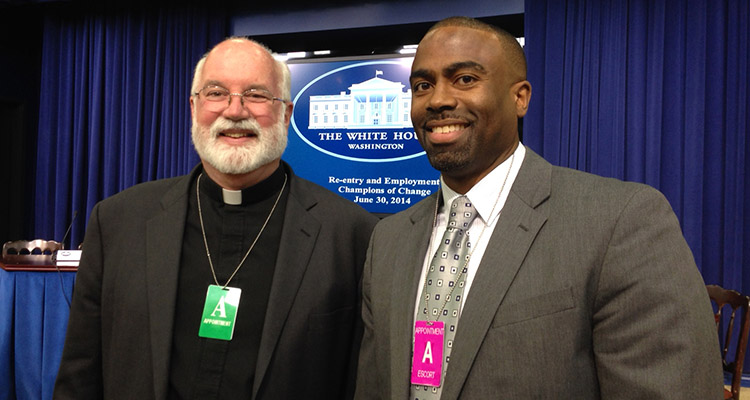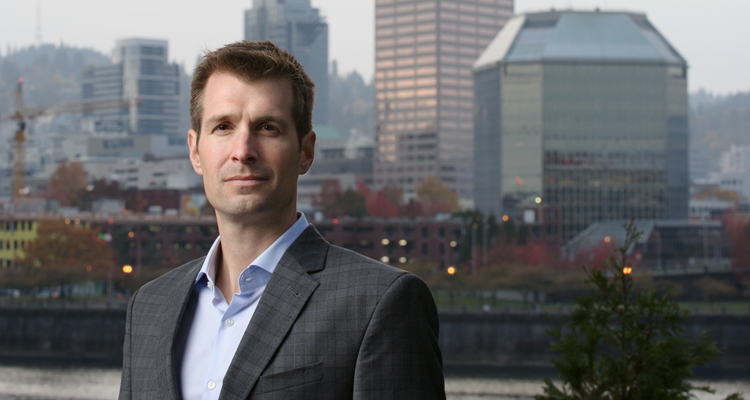Daryl Atkinson '07 is a man on a mission to ensure that equal justice under the law is realized for those with a criminal past. His mission is simple: restore the civil rights and human rights of people with criminal records. This may appear to be a mighty feat as America has the highest rate of incarceration in the world with more than 2 million people in prison and 65 million people with a criminal record. For Atkinson, however, this is an eternal battle for justice, and his law degree has equipped him with the tools to wage this battle in a strategic and calculated manner.
Atkinson’s Personal Journey: From the Jailhouse to the White House
Atkinson’s decision to pursue a career in the law was not taken lightly. He desired to become an attorney in order to redress a moral injustice – the impact of the war on drugs. In 1996, Atkinson pled guilty to a first-time, non-violent drug crime and served 40 months in prison (based upon a mandatory minimum sentence). He remembers receiving ineffective legal counsel from an attorney he paid a substantial retainer. Ultimately, Atkinson left this experience feeling victimized by his attorney and the criminal justice system because he received the same sentence that he would have if he appeared pro se. After this experience he was determined to “know the rules of the game” by gaining a deeper understanding of the intricacies of the law.
Atkinson was determined to never forget his past and committed to ensuring more people were fully restored after leaving the prison gates. He compares his personal experience to the prodigal son, a powerful biblical account of redemption. Similar to the prodigal son who returned home to a feast and received a signet ring (which reflected the restoration of his societal status), Atkinson was welcomed home to a loving family and nurturing community.
This support was critical to his success. He has no delusions of grandeur that there is anything special about him. His successes are a direct result of his network of support. He believes if more people had access to food, clothing and shelter post-release then they could make good strategic choices, as he was able to do. Unfortunately, for too many people, this is not a reality; hence, they are not fully restored to their sense of humanity nor their citizenship. Atkinson was determined to create a pathway to liberty for all. His pledge to attend law school soon became a reality.
Atkinson was drawn to the University of St. Thomas School of Law due to our social justice mission. He describes the mission as “icing on the cake.” While at UST, he was an exemplary student who modeled leadership and academic excellence. He was an active member of the Black Law Students Association through which he promoted community engagement and supported education programs.
Upon graduation, he began his work in North Carolina and beyond of advancing justice for those with a criminal past. Atkinson focused his efforts on his passion: using legal services and advocacy to eliminate the second-class status of people with criminal records. He is a founding member of the North Carolina Second Chance Alliance, a burgeoning statewide coalition of advocacy organizations, service providers, faith-based organizations and community leaders that have come together to achieve the safe and successful reintegration of adults and juveniles returning home from incarceration. Moreover, Atkinson serves on the North Carolina Indigent Defense Services Commission and the Commission for Racial and Ethnic Disparities in the Criminal Justice System. Most notably, Atkinson helped develop the Collateral Consequence Assessment Tool (C-CAT), an online searchable database that allows the user to identify the collateral consequences triggered by NC arrests, indictments and convictions. C-CAT was one of the first databases of its kind and served as a template for the American Bar Association’s National Inventory of Collateral Consequences of Conviction.
Today, Atkinson serves as a senior attorney at the Southern Coalition for Social Justice (SCSJ), where his work focuses on criminal justice reform. SCSJ follows a community-lawyering model where lawyers, social scientists, media specialists and community organizers work together to advance social justice. Atkinson has developed a multifunctional toolbox that includes community education and organizing, public policy advocacy, direct representation and impact litigation. These tools provide Atkinson with many advocacy strategies for advancing the cause of justice.
On June 30, 2014, Atkinson’s advocacy work drew national attention. He was honored with a White House Champions for Change award. According to a White House news release, “The Champions have distinguished themselves through their extraordinary dedication and hard work to help those with criminal records re-enter society with dignity and viable employment opportunities.” Attorney General Eric Holder recognized Atkinson’s transformative journey in his remarks when he said, “Daryl overcame his own involvement with the criminal justice system and has since worked to build a better future not only for himself – but for countless others who deserve a second chance.”
Atkinson describes himself as a modern-day abolitionist due to his vow to deconstruct the current criminal justice system and end the second-class status of people with criminal records. He quotes the statistics of the United States having only 5 percent of the world’s population and 25 percent of the world’s prison population. He warns: “We are either a country with really bad citizens or we are doing something terribly wrong in our criminal justice system.”
Pearls of Wisdom for the Next Generation of Social Engineers
Despite all of his accolades and victories in the fight for justice, Atkinson believes he has not accomplished anything until we radically transform the criminal justice system. He warns, “We have plenty of work to do.” Atkinson believes that he is only passing a baton with his advocacy. He provides an image of a relay race in completing the “unfinished business” of protecting the civil and human rights of felons.
He is handing the baton to the next generation of law students by challenging them to become social engineers. He offers pearls of wisdom for running this race: 1) Find a creative way to finance your legal education to remain free from the golden handcuffs associated with student loan debt. This will allow you to seek the career that aligns with your vision for justice and life’s calling. Atkinson knows the generous scholarship he received from St. Thomas empowered him to do the work he is doing today. 2) Be driven by what you are most excited about even if it is not the most popular or lucrative area of the law. Your passion will drive you to wake up and do the work.
Similar to the David-and-Goliath story, Atkinson wages war against the “Goliath” of mass incarceration and the prison industrial complex. He has modeled courage and boldness as he re-imagines a nation without second-class citizenship for those who have a criminal past. He has his sword (his legal training), buckler (his passion for justice) and shield (his faith). Atkinson is well equipped to bring this giant to its knees as he spreads his vision for justice.
Artika Tyner ’06 J.D., ’12 Ed.D.,is assistant professor of public policy and leadership in the St. Thomas College of Education, Leadership and Counseling, and former diversity director at UST School of Law.
Read more from St. Thomas Lawyer.







